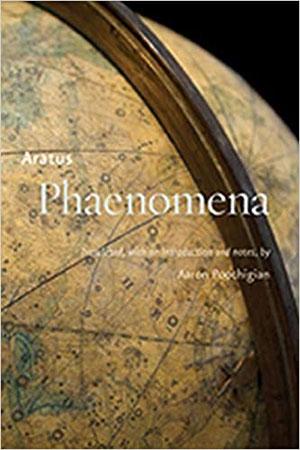Aratus' Phaenomena
Translated, with an Introduction and Notes, by Aaron Poochigian
Available May 28th, 2010.
Order now.
After the Iliad and the Odyssey, the Phaenomena was the most widely read poem in the ancient world. Its fame was immediate. It was translated into Latin by Ovid and Cicero, quoted by St. Paul in the New Testament, and was one of the few Greek poems translated into Arabic.
Aratus' Phaenomena is a didactic poem -- a practical manual in verse that teaches the reader to identify constellations and predict weather. The poem also explains the relationship between celestial phenomena and such human affairs as agriculture and navigation. Despite the historical and pedagogical importance of the poem, no English edition suitable for students and general readers has been available for decades. Aaron Poochigian's lively translation makes accessible one of the most influential poets of antiquity. Poochigian's interpretation of the Phaenomena reestablishes the ancient link between poetry and science and demonstrates that verse is an effective medium for instruction.
Featuring references to Classical mythology and science, star charts of the northern and southern skies, extensive notes, and an introduction to the work's stylistic features and literary reception, this dynamic work will appeal to students of Ancient Greece who want to deepen their understanding of the Classical world.
Review in The Times Literary Supplement, January 28th, 2011, p. 27:
Aratus, born c.310 BC at the Greek colony of Soloi in southern Turkey , was part of the great first generation of Hellenistic Greek poets which included Apollonius of Rhodes, Callimachus of Cyrene and Theocritus of Syracuse. His sole surviving poem, the Phaenomena ('Visible Signs'), is a single book of 1154 Homeric-style hexameters which describes in considerable detail the constellations, their use for measuring time and their function as weather-signs; partly a poetic version of the lost prose manual on astronomy by Eudoxus of Cnidus from the previous century, it is an early example of the paraphrastic tradition of poems versifying established prose material which includes Lucretius' De Rerum Natura, Virgil's Georgics and Milton's Paradise Lost. It was widely read from its first appearance, much imitated by Latin poets and even translated into Arabic.
Aaron Poochigian here gives us an Aratus for our own time, turned in witty heroic couplets which fittingly recall Pope's didactic poems, decently faithful to the original, and helpfully introduced and annotated. The end of the initial invocation to the Stoic-style Zeus, 'By your grace, / I aim to rise as high as mortal may, / Hymning the heavens while you light the way', combines effective alliteration and expressive monosyllables, while the description of Justice preaching to the degenerate masses is splendidly entertaining with its colourful vocabulary and climactic double rhyme: 'From twilit foothills she would steal alone / And chasten humans in a harsher tone./ While gawkers hunkered on a mountainside/ She would give speeches from the peak, deride / Their crimes and swear that she would keep her distance/ However much they cried out for assistance'. This lively and polished version illuminates why this potentially austere catalogue poem was so enthusiastically read for so many centuries, and it is to be warmly welcomed.
—Stephen Harrison, Professor of Latin Literature and Fellow and Tutor in Classics, Corpus Christi College, Oxford.

